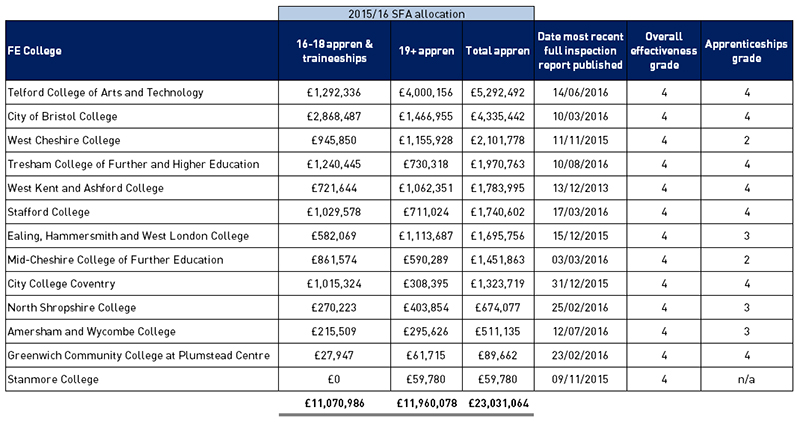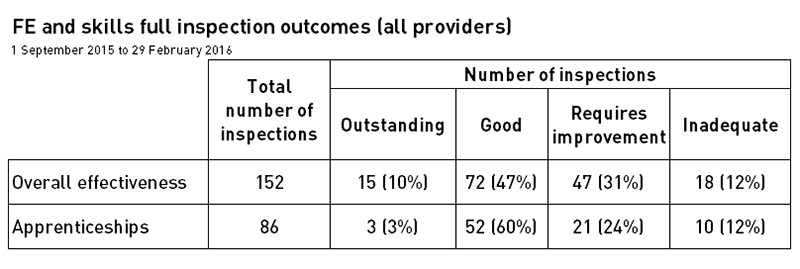Nearly all employers will only have to contribute 10 per cent to the cost of an apprenticeship from April 2017, the Department for Education has announced this morning.
The news, previously reported when leaked to FE Week, comes as part of a three week consultation which details how much colleges and training providers would be paid for apprenticeships once the levy kicks in. Click here to read in full, and here for updated guidance webpage.
This means the government will pay 90 per cent of the costs for 98 per cent of employers, those with annual wage bills below £3m and thus not paying the levy.
Despite retaining plans to introduce a mandatory cash contribution for the first time it will be hoped this generous 10 per cent arrangement (it is 33 per cent in the pilot) will address fears that small employers wouldn’t engage in the reformed apprenticeship programme.
However, Mark Dawe, chief executive at the Association of Employment and Learning Providers, is very concerned about the impact of a mandatory employer fee. He told FE Week: “the insistence of a cash contribution could in our view still have a very negative impact. Therefore AELP has asked ministers to keep the matter under review. The requirement should be quickly phased out if our fears about the impact are realised.”
Other new announcements within the consultation include:
> A £2,000 incentive to help 16-to 18-year-olds, young care leavers and young people with an Education and Health Care (EHC) plan, make their first step into the world of work – split £1,000 to employers and £1,000 to training providers.
> Employers with fewer than 50 employees will not have to pay anything towards the cost of training a 16-to 18–year-old apprentice, young care leaver or young person with an EHC plan.
> Levy paying employers, those with annual payroll bills over £3m, will receive a 10 per cent monthly top-up. However, if their levy account is insufficient then like smaller employers, 90 per cent of their additional apprenticeship training costs will be subsidised.
> To help employers see how the levy and funding system would work for them, the government has launched a new online calculator, which can be seen here.
> A new register of apprenticeship training providers will be introduced from April 2017, details of which can be found in the consultation. Yesterday FE Week reported on one potential barrier, excluding those with an Ofsted grade four.
> All apprenticeship frameworks and standards starts from April 2017 will be funded from one of 15 bands, each with an upper limit ranging from £1,500 to £27,000. It will then be up to employers to negotiate prices with providers. The AELP had been calling for a lower limit to the band for fears of a deflating price war, but this appears to have been ignored. Mr Dawe added: “If there is no lower limit we could now see bidding wars for employers’ custom where the price of delivering the training is the main consideration. A very low price could have a damaging effect on quality which will certainly not be in the interests of the apprentice. AELP will monitor this and if necessary will press for the introduction of a minimum price”
With the change in ministers, short time before implementation and delay to the announcement, some powerful interest groups will be disappointed as they had hoped the levy would be put on ice.
Last month the CBI increased their opposition by shifting from demands for changes to telling FE Week they wanted an outright delay.
Robert Halfon, the newly appointed Apprenticeships and Skills Minister said today: “We need to make sure people of all ages and backgrounds have a chance to get on in life. Apprenticeships give young people – especially those from disadvantaged backgrounds – a ladder of opportunity. That’s why we continue to work tirelessly to deliver the skills our country needs. The apprenticeship levy is absolutely crucial to this.
Our businesses can only grow and compete on the world stage if they have the right people, with the right skills. The apprenticeship levy will help create millions of opportunities for individuals and employers. This will give our young people the chance they deserve in life and to build a highly-skilled future workforce that the UK needs.”
Responses to the consultation are via a survey which must be submitted by 5 September and “final funding proposals will be confirmed in October 2016.”





